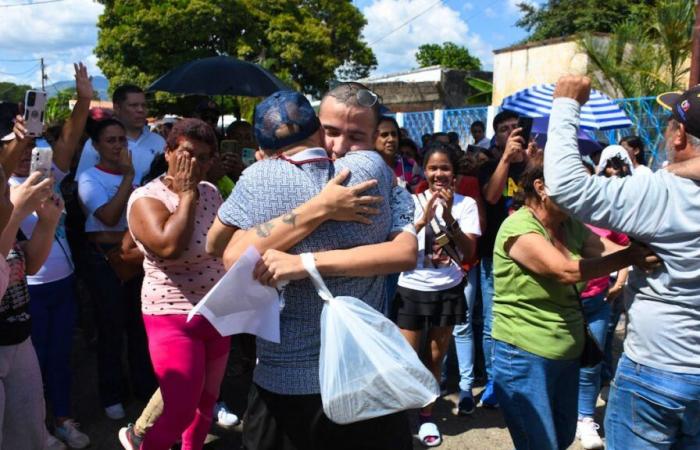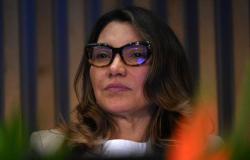A man arrested during protests after the disputed re-election of Venezuelan President Nicolas Maduro, is released from prison, in Tocuyito, Venezuela, November 16, 2024.
AFP
At least 79 people out of some 2,400 officially arrested after the disputed re-election of Venezuelan President Nicolas Maduro at the end of July were released on Saturday, while the prosecution promises a total of 225 releases over the weekend.
“So far, at least 70 political prisoners have been released,” said the director of the NGO Foro Penal, Alfredo Romero, on social networks. AFP journalists witnessed the release of nine people following this announcement. “225 detainees will be released” this weekend, said a source from the prosecution.
On Friday the prosecution had promised the re-examination of 225 files among the 2,400 people arrested during the unrest which followed the proclamation of Nicolas Maduro’s victory by the National Electoral Council, considered to be under the orders of power.
28 dead and nearly 200 injured
The opposition calls fraud and claims the victory of its candidate Edmundo Gonzalez Urrutia. The United States, Europe and many Latin American countries do not recognize Nicolas Maduro’s second re-election.
The death toll from post-election violence stands at 28 dead and nearly 200 injured, according to Attorney General Tarek William Saab.
“I feel a little lost after such a long period of incarceration… I feel at peace […] (The three months) were quite hard, I had faith that we were going to get out because we are all innocent,” Andres Galea, 31, waiter and seller, one of those released from Yare prison, told AFP. III about a hundred kilometers from Caracas. Accompanied by his crying mother, he was applauded by the hundred people who had been waiting for his release since the morning.
“He is innocent”
From the early hours of the day, rumors of upcoming releases brought dozens of relatives of detainees to the front of the prisons.
“The anxiety level is not decreasing! Until they are free, I cannot say that they are free. It was the worst thing that ever happened to our family. The worst […] It was hard. And it affects a lot of people, outside and inside. We are all mothers,” says Nelia Olivares, close to three imprisoned people: her brother-in-law and her two nephews.
“We came today because we heard about it on social networks,” Alexandra Hurtado, 47, told AFP in front of Yare III, wearing a T-shirt with a photo of her son, Oscar Escalona, 23, and the slogan: “He’s not a terrorist, he’s innocent.”
“Some sort of procedural error”
In front of Las Crisalidas women’s prison (also near Caracas), a group waits. “These four months have been horrible, seeing my daughter cry […] I told him that mom was going to come back,” Junior, a 34-year-old cook, told AFP, who preferred not to give his last name, waiting to find out if his wife was going to be released.
“If there are cases to be rectified and re-examined, it is also so that justice is done […] in case there was some sort of procedural error,” President Maduro declared on Monday, indicating that justice would examine new cases.
Hundreds of families have organized protests in recent weeks to demand the release of their loved ones. The opposition regularly denounces the “inhumane” conditions of detention of those arrested.
A “repressive crisis” in Venezuela
On Thursday, an opposition activist died in prison. The day before, his family had reported the poor condition of a necrotic leg. Foro Penal on Thursday denounced a “repressive crisis” in Venezuela “with this enormous figure of 1,976 political prisoners”, compared to 305 before the July 28 presidential election.
“We are talking about the largest number of political prisoners of the 21st century, the largest number of political prisoners in the entire American continent,” Alfredo Romero told AFP at the time.
Since the contested re-election of President Maduro, Edmundo Gonzalez Urrutia has taken refuge in Spain and the leader of the opposition, Maria Corina Machado, lives in hiding.






